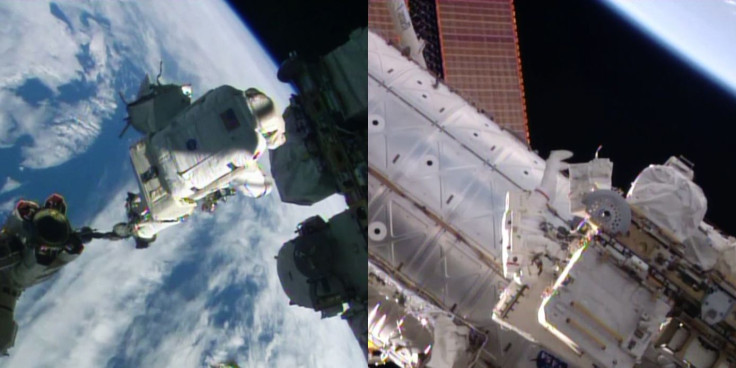Astronauts Complete First Spacewalk Of Expedition 41, Work Outside ISS For 6 Hours

Two astronauts on the International Space Station, or ISS, successfully completed the first of three Expedition 41 spacewalks at 2:43 p.m. EDT on Tuesday. During the spacewalk, the astronauts worked outside the Quest airlock of the space station for more than six hours.
The two astronauts -- Reid Wiseman of NASA and Alexander Gerst of the European Space Agency -- first relocated a failed cooling pump, which was temporarily stowed on the station’s truss by Expedition 38 spacewalkers Mike Hopkins and Rick Mastracchio in December. The other tasks included replacing a light on an external television camera group outside the ISS' Destiny laboratory and installing a Mobile Transporter Relay Assembly, or MTRA, on to the solar power truss right above Destiny, according to NASA.
The MTRA allows flight controllers to provide power to attached payloads even if any technical glitch prevents the transporter's payload attachment fitting from drawing power from worksites, CBS News reported.
“Alex and I, we'd like to express just our huge gratitude for getting us back into planned EVAs (spacewalks), safely outside, safely back in,” CBS News quoted Wiseman as saying. “It's a good day for NASA, it's definitely a good day for the European Space Agency.”
A second spacewalk is scheduled for Oct. 15 when Barry Wilmore of NASA will follow Wiseman outside the Quest airlock for a six-and-a-half hour excursion. The goal of the spacewalk will be to replace a failed component for regulating voltage. They will also move external camera equipment ahead of a major reconfiguration of station modules next year.
The first Russian spacewalk of Expedition 41 is scheduled for Oct. 22 when cosmonauts Alexander Samokutyaev and Max Suraev will wear Russian Orlan spacesuits and exit the Pirs docking compartment at 9:24 a.m. EDT, according to NASA.
© Copyright IBTimes 2024. All rights reserved.






















